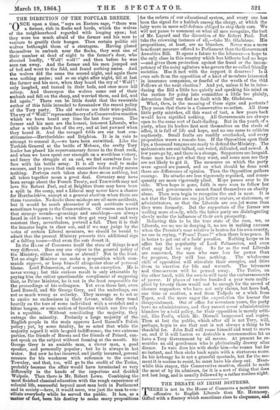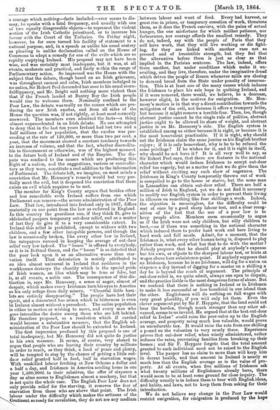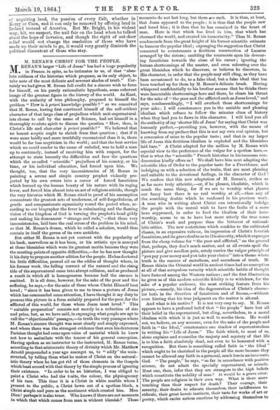THE DEBATE ON IRISH DISTRESS.
THERE is not in the House of Commons a member more offensive to English Liberals than Mr. Hennessy. Gifted with a fluency which sometimes rises to eloquence, sad The member for King's County argues that besides other million of Irish in England, yet we do not find it necessary and less remediable evils Ireland suffers from one which to modify our English system in order to prevent their living Parliament can remove—the severe administration of the Poor in idleness on something like four shillings a week. Indeed, Law. That law, introduced into Ireland only in 1837, differs the objection is meaningless, for the difficulty could be materially on one point from the law as enforced in England. met at once by a good sharp labour test, and a clear recog- In this country the guardians can, if they think fit, give to nition of the fact that the use of a poor law is to ablebodied paupers temporary out-door relief, and as a matter keep people alive. Members seem occasionally to argue of fact they do give it to a very considerable extent. In as if the Irish were not only children, but silly children to Ireland this relief is prohibited, except to widows with two boot,—as if there was something in the national character children, and a few other incapable persons, and though the which induced them to prefer hard work and bare living to law is occasionally broken, like every other law in Ireland, hard work and full meals. Admit, for a moment, that the the ratepayers succeed in keeping the average of out-door Irishman is, what every other human being is, disposed to play relief very low indeed. The " house " is offered to everybody, rather than work, and what has that to do with the matter ? as it is in Bethnal Green, and the " house" is so detested that Nobody proposes that he should play at anybody's expense the poor look upon it as an alternative worse than star- but his own, or objects to the sharpest labour test, or hints at The first impression produced by this proposal is one of a pound on the valuation to very nearly three. Experience total inadequacy, but Mr. Hennessy did not quite do justice proves that out-door relief, when wisely administered, rather to his own measure. It seems, of course, very absurd to reduces the rates, preventing families from breaking up their argue that people who are leaving their country by millions homes ; and Sir F. Heygate forgets that the total amount in order to reach, as they think, a land of peace and plenty, granted to each individual need not be raised to the English will be tempted to stay by the -chance of getting a little out- level. The pauper has no claim to more than will keep him door relief granted half in food, half in starvation wages. in decent health, and that amount in Ireland is nearly as With unskilled labour fetching at New Orleans a dollar and much less than the English average as is the value of pro- a half a day, and Irishmen in America sending home in one perty. At all events, when five millions of Irishmen ask year 1,500,0001. to their relatives, the offer of sixpence a what twenty millions of Englishmen already have, there day as alms seems to Englishmen almost a mockery, but that would seem to be at least some ground for close inquiry. The is not quite the whole case. The English Poor Law does not difficulty usually is to induce them to bear with English ideas, only provide relief for the starving, it removes the fear of and habits, and laws, not to keep them from asking for their starvation from those who are above that point. The Irish introduction. a courage which nothing—facts included—ever seems to dis- between labour and want of food. Every bad harvest, or may, he speaks with a fatal frequency, and usually with one great rise in prices, or temporary cessation of work, threatens of two equally disagreeable objects—to represent the violent them, as it does the French ouvriers, with the pains of actual section of the Irish Catholic priesthood, or to increase his hunger, the one misfortune for which neither patience, nor favour with the Court of the Tuileries. On Friday night, forbearance, nor courage affords the smallest remedy. They however, he for once turned his facility of statement to a do not, indeed, say with the people of Paris that they national purpose, and, in a speech as unlike his usual oratory Will have work, that they will live working or die fight- as pleading is unlike declamation called on the House of ing, for they are linked with another race not so Commons to adopt a remedy for one of the evils which are so pressed and of irresistible strength, but, they feel that rapidly emptying Ireland. His proposal may not have been the alternative before them is just as clear as that wise, and was certainly most inadequate, but it was, at all implied in the Parisian sentence. The law, indeed, offers events, moderate and practical, and fairly within the range of them another, but under conditions which make it un- Parliamentary action. So impressed was the House with the availing, and ;hey live, therefore, under the imaginative dread subject that the debate, though based on an Irish grievance, which drives the people of Rouen whenever mills are closing was throughout earnest and calm, Irish members indulged in to demand bread from the State under penalty of insurreo- no antics, Sir Robert Peel descended but once to his usual scorn- tion. This is at least one of the many causes which induces fulfiippancy, and Mr. Bright said nothing more violent than the Irishman to place his sole hope in quitting Ireland, and that if the French landed at Bantry Bay the Irish people if it were removed, there would, we believe, be a decrease, would rise to welcome them. Nominally confined to the however slight, in the motives for emigration. Mr. Hen- Poor Law, the debate was really on the causes which are pro- nessy's motion is in that way a direct contribution towards the ducing the new ,Irish exodus, and from all sides of the mitigation of the evil, not because it offers a trumpery bribe, House the question was, if not rightly, at least most earnestly but because it might remove a terrible fear. Then, too, though answered. The members even admitted the facts—a thing abstract justice cannot be the single rule of politics, abstract almost unprecedented in an Irish debate. No one attempted justice ought to be allowed its share of weight, and abstract to deny that in the last ten years Ireland had lost two and a justice is on Mr. Hennessy's side. The English system is half millions of her population, that the exodus was pro- established among us either because it is right, or because it is ceeding at the rate of 120,000, or more than two per cent. a the most benevolent practicable. If it is right, why should year, that the movement showed a constant tendency towards not the Irishman claim the same justice as his English brother an increase of volume, and that the fact, whether discredita- enjoys ; if it is only benevolent, why is he to be refused the ble to Government or otherwise, was of the highest moment same privilege ? If he wishes for it, and it is right in itself, to the future both of Ireland and of the Empire. The die- why should he not have it ? It is all very well to say, as pute was confined to the causes which are producing this Sir Robert Peel says, that there are features in the national flight of a nation, and the suggestions, various or contradic- character which would induce Irishmen to accept out-door tory as they wore, constitute a real addition to the information relief too eagerly, but as a matter of fact we do give them the of Parliament. The debate left, we imagine, on most minds a relief without exciting any such show of eagerness. The conviction that Mr. Hennessy's remedy would but very par- Irishman in King's County temporarily thrown out of work tially meet the evil, but it deepened the conviction that there is compelled to go to the house or starve, but the same man exists an evil which requires to be met. in Lancashire can obtain out-door relief. There are half a nation itself. That detestation is mainly attributed to wages above bare subsistence-point. If anybody supposes that an idea almost universal in Ireland that residence in the an Irishman, because he is an Irishman, will dig for a union on workhouses destroys the chastity which is the special pride sixpence a day instead of digging for a master on a shilling a of Irish women, an idea which may be true or false, but day he is beyond the reach of argument. The principle of is, at all events, a noble one. The consequence of this dis- out-door relief is, we quite admit, always one open to dispute, tinction is, says Mr. Hennessy, a sense of anger, almost of and the practice liable to the most dangerous forms of abuse. But despair, which makes every Irishman turn his eyes to America we contend that there is nothing in Ireland or in Irishmen as his only refuge from daily misery. "Cheerful little ham- to make it less successful or less beneficial in one island than lets are entirely disappearing." The people have lost their the other. Englishmen will do nothing on full wages with spirit, and a discontent has arisen which in bitterness is even very great placidity, if you will only let them. Even the in Ireland almost without a precedent. The entire population clever argument put by Sir F. Heygate, that the land could not is either in motion or wishing to move, and every man who bear the burden, though much stronger than any other ad- . goes intensifies the desire among those who are left behind. vaned, seems to us invalid. He argued that at the best out-door He therefore proposed, as a resolution which if carried relief in Irelae .could raise the poor-rates up to the English would become a substantive measure, that the English ad- average, and property tieing much less valuable, would prove ministration of the Poor Law should be extended to Ireland. an unendurable tax. It would raise the rate from one shilling
of acquiring land, the passion of every Celt, whether in Kerry or Caen, and it can only be removed by offering land in Ireland instead of America. But Mr. Bright, in his violent way,. hit, we suspect, the nail fair on the head when he talked about the hope of invasion, and though the right of out-door relief would not change the resolution of those who have made up their minds to go, it would very greatly diminish the political discontent of those who stay.




































 Previous page
Previous page